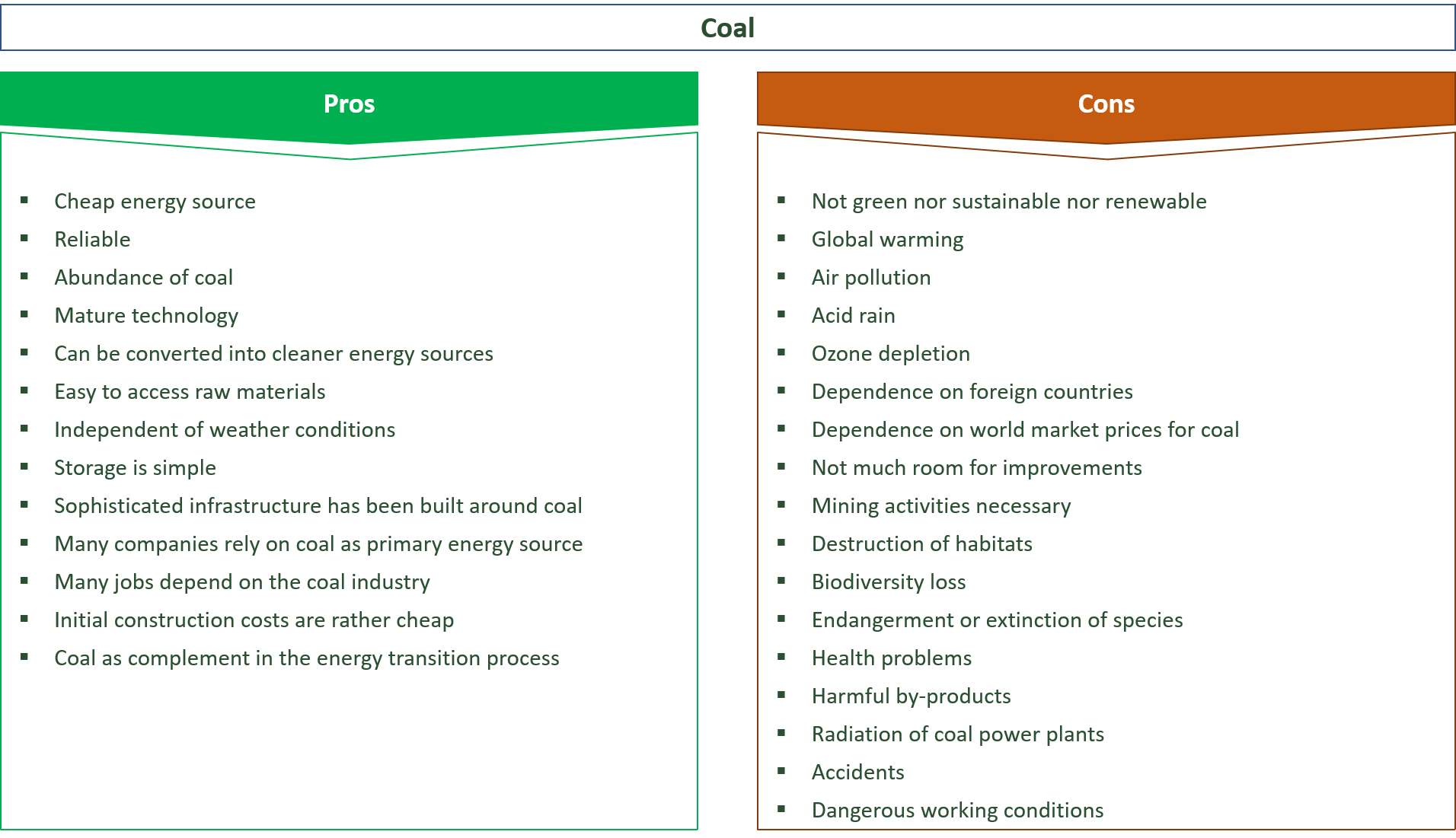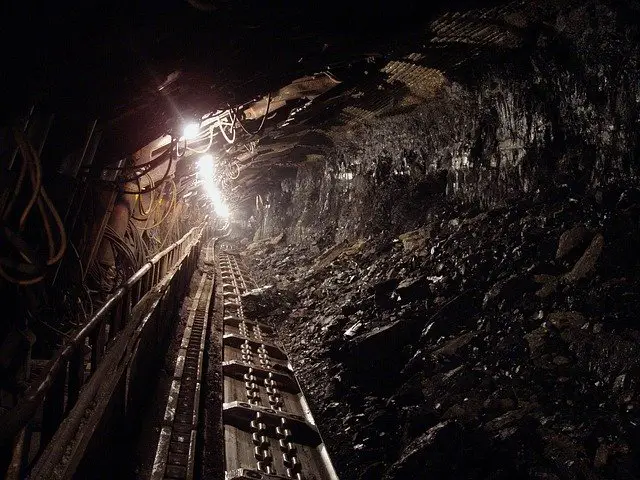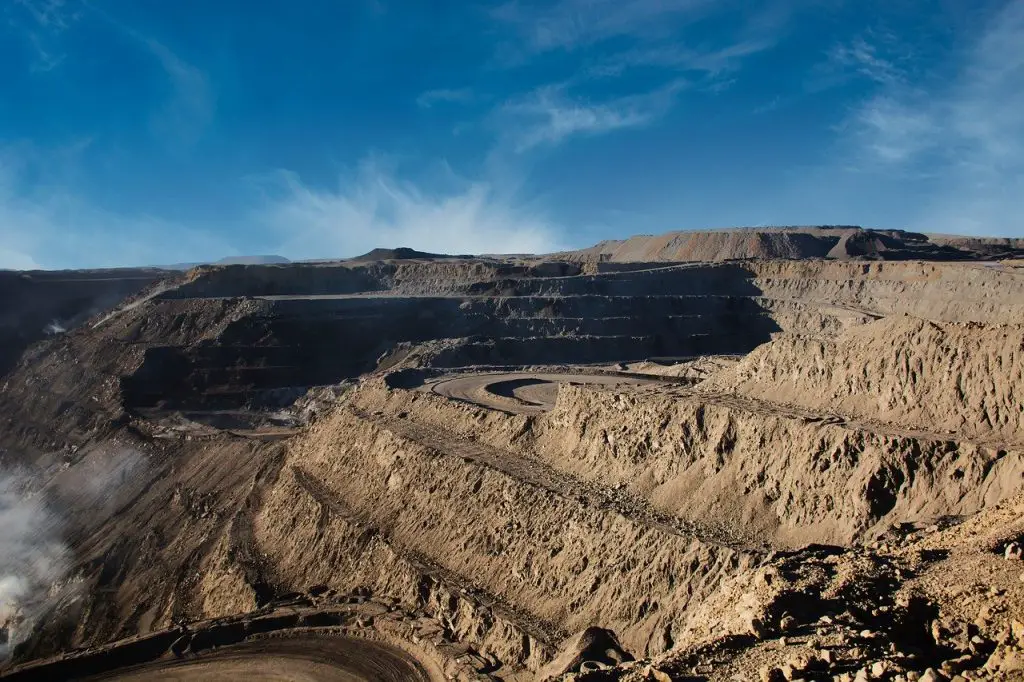“Coal and oil lobbyists added fossil fuels to a bill aimed at helping American manufacturers, so they too could claim ‘manufacturing’ tax deductions.”
Bernie Sanders, Politician
Advantages & Disadvantages of Coal

Coal is one of the most important energy sources in order to meet our global energy demand.
It has been used over the past decades and significantly improved our overall wealth.
However, coal also has many serious downsides.
In this article, the pros and cons related to the use of coal are examined in detail.
Audio Lesson
Contents
Advantages of Coal Energy
- Cheap energy source
- Reliable
- Abundance of coal
- Mature technology
- Can be converted into cleaner energy sources
- Easy to access raw materials
- Independent of weather conditions
- Storage is simple
- Sophisticated infrastructure has been built around coal
- Many companies rely on coal as primary energy source
- Many jobs depend on the coal industry
- Initial construction costs are rather cheap
- Coal as complement in the energy transition process
Cheap energy source
One advantage of coal is that it is a rather cheap source of energy.
Since plenty of research has been done on coal, processes have been optimized over time and the efficiency has been increased significantly over the past decades.
Thus, it is possible to produce energy from coal at a low cost per energy unit.
Reliable
The energy production with coal can also be considered to be quite reliable since the power production processes have been quite steady and stable over the past and will likely continue to be stable in the future.
Also coal power plants are quite reliable and there is no reason to believe that those power plants may break down at any point in time on a large scale.
Abundance of coal
Even though coal is a fossil fuel and is therefore considered to be a non-renewable power source, there is still plenty of coal in the ground which could be mined.
Experts estimate that our coal reserves would last for another few hundred years.
Therefore, contrary to other fossil fuels, the supply with coal should be ensured for a sufficient period of time.
Mature technology
Since coal has been a primary energy source for many decades, it is a quite mature technology and the processes as well the infrastructure around coal has been optimized over time.
Hence, the energy supply with coal can be considered to be quite reliable and efficient, which gives it an edge over alternative energies which have yet to be optimized and explored in order to increase their efficiency.
Can be converted into cleaner energy sources
The burning of coal implies the emission of many harmful gases into our atmosphere.
However, instead of burning coal, coal can be converted into liquid fuels, which emit lower amounts of harmful gases into the air.
Thus, the emission of harmful gases and particles could be lowered to a certain extent by converting coal into liquids.
However, even though this lowers the problem of air pollution to a certain extent, there is still plenty of pollution from the combustion process.
Easy to access raw materials
With our nowadays sophisticated technologies, it is quite easy to detect coal deposits.
Through mining processes, those coal deposits could be accessed in an efficient manner and large amounts of coal could be extracted and processed for energy production purposes.
Independent of weather conditions
Coal is also quite robust when it comes to changes in weather or overall climatic conditions.
While alternative energies like solar and wind energy are heavily dependent on outside weather conditions like sunshine and wind, coal power can be produced in almost all weather conditions.
Thus, the power supply from coal can be regarded to be more secure since it is independent of outside conditions.
Storage is simple
Coal can also be easily stored in a relatively safe manner.
This is not true for all raw materials which are used for energy production.
For instance, if energy is produced with hydrogen fuel cells, the storage of raw materials is quite expensive and difficult.
Hence, also in this category, coal has significant advantages over some other energy sources.
Sophisticated infrastructure has been built around coal
Since coal has been a primary energy source for such a long period of time, the processes as well as the infrastructure that has been built around coal are quite optimized and sophisticated.
Thus, most of the processes related to energy production with coal can be executed in an efficient manner and significant problems in the supply chain are rather rare.
Many companies rely on coal as primary energy source
The popularity of coal is also true when it comes to the corporate sector.
Many manufacturing companies heavily rely on coal as primary energy source.
Without coal, they would no longer be able to execute their processes in a cost-efficient manner.
Therefore, coal is quite important for many firms on a global scale in order to survive in the short run.
Many jobs depend on the coal industry
The energy production with coal is a major industry branch.
This also implies that millions of jobs depend on the coal industry on a global scale.
Through the energy transition process from fossil to renewable energies, those jobs are threatened.
It is in the government’s responsibility to provide people who lose their jobs with social security so that those people are not threatened by homelessness or starvation.
Initial construction costs are rather cheap
Compared to the construction and installation of nuclear power plants or hydropower plants, the construction of coal power plants is rather cheap and can also be done in a shorter period of time.
Thus, especially if there is an urgent need for more energy, coal power plants would be able to deliver this energy in a shorter period of time.
Coal as complement in the energy transition process
Even though coal is a fossil and not a green power source at all, it might still be important in the energy transition process for supplying a baseload of energy so that the energy supply of the general public would be ensured in case alternative energies would fail to deliver sufficient power in the short run.
Consequently, energy from coal could be regarded as kind of insurance in the overall transition process from fossil to renewable energies.

Disadvantages of Coal
- Not green nor sustainable nor renewable
- Global warming
- Air pollution
- Acid rain
- Ozone depletion
- Dependence on foreign countries
- Dependence on world market prices for coal
- Not much room for improvements
- Mining activities necessary
- Destruction of habitats
- Biodiversity loss
- Endangerment or extinction of species
- Health problems
- Harmful by-products
- Radiation of coal power plants
- Accidents
- Dangerous working conditions
Not green nor sustainable nor renewable
One of the biggest problems of coal as an energy source is that it is not green at all.
In the combustion process of coal, plenty of harmful gases are emitted into our atmosphere.
Moreover, coal is also a non-renewable resource, meaning that it will be depleted sooner or later.
If we still rely on coal as primary energy source at the time coal becomes depleted, we as humanity will be in serious trouble.
However, since the energy transition from fossil to renewable energies has already started, we will likely never experience this adverse coal depletion scenario.
Global warming
Another big downside of coal is that in the energy production process, large amounts of greenhouse gases are emitted into the air.
In turn, this contributes to global warming and the related horrible effects.
Therefore, we as humanity should not rely on coal as primary energy source in the future anymore if we want to protect our planet from the issues related to global warming.
Air pollution
Apart from greenhouse gas emissions, there are also other sorts of air pollution related to the combustion of coal.
For instance, by burning coal, large amounts of small particles are emitted into the air, which pollutes our air and can also lead to serious pulmonary issues.
Thus, our air quality significantly suffers from the combustion of coal.
Acid rain
Through the increase in air pollution, also the chances for the formation of acid rain increases significantly.
Even though acid rain is often not discussed as a main environmental issue in the media, it can lead to serious environmental problems. For instance, with acid rain, the acidity level of the soil is altered.
Since plants are usually quite sensitive to changes in their natural conditions, chances are that crop yields will be significantly lower over time due to acid rain.
In turn, this could lead to serious global hunger, especially in poor developing countries where millions of people rely on crop yields as their main source of food supply.
Ozone depletion
The combustion of coal also implies the emission of harmful gases that could contribute to the depletion of the ozone layer.
Our ozone layer can be regarded as natural shield in order to protect us and the local flora and fauna from excessive sunlight and radiation.
If this layer becomes depleted, the chances for diseases like cancer increase dramatically.
Dependence on foreign countries
Another big issue not only from coal but also from other fossil fuels is that the use of those fossil fuels leads to heavy dependence on other countries.
Coal exporting countries are in a quite comfortable position since they have plenty of coal to export.
On the other hand, most countries are heavily dependent on those countries since their industries and also the local population needs coal for manufacturing and heating purposes.
Thus, by using coal as primary energy source, countries make themselves quite dependent on coal-exporting countries.
If there are any political issues, many countries may suffer from a shortage of coal.
Dependence on world market prices for coal
The dependence on other countries for coal supply also implies the dependence on world market prices for coal.
Since coal is a finite resource, chances are that the price for coal may increase over the next decades.
Countries that still rely on coal in the future will have to deal with higher costs related to this energy source, which may weaken their overall economic position in a globally competitive environment.
Not much room for improvements
Since the production of energy with coal had been done for many decades, processes related to this kind of energy production are already quite mature and the room for improvements in efficiency may be quite limited.
Hence, while other alternative energies still have plenty of room for improvement, coal might lose its position as important energy source over time.
Mining activities necessary
For the extraction of coal, mining processes are necessary.
However, mining also implies serious environmental issues.
For instance, for mining purposes, large areas of land have to be used and natural living conditions for the local flora and fauna may be altered in an adverse manner.
Moreover, also the local population may suffer since many people might have to relocate and leave their homes behind due to mining practices.
Destruction of habitats
Through mining practices related to coal, many natural habitats are destroyed on a daily basis.
Thus, many animals have to move and find a new home.
Natural habitats are altered in an adverse manner, which may lead to ecological imbalance and other issues since ecosystems are heavily interconnected.
Biodiversity loss
Through global warming, mining practices and other issues related to the use of coal as energy source, the overall level of biodiversity will decline significantly.
This is especially true in areas where excessive mining is executed in order to extract large amounts of coal. In those areas, the population of animals and plants may decline dramatically.
Endangerment or extinction of species
In the worst case, through the destruction of habitats related to coal mining and the effects of global warming, some animal and plant species may become endangered or even extinct.
In the last couple of years, the number of animals and plants that are on the endangered list of the IUCN has increased dramatically.
According to scientists, most of this increase is due to human intervention.
Health problems
The emissions of harmful gases and particles related to the combustion of coal can also cause serious health issues.
For instance, in areas with high emissions and low levels of air quality, the chances for asthma and other pulmonary diseases increases significantly.
Moreover, the probability of serious diseases like lung cancer also increases.
Harmful by-products
Through the use of coal for energy production purposes, harmful by-products like ash and other substances are produced.
These harmful components have to be disposed of with great care in order to avoid environmental pollution.
Especially in countries where regulatory standards regarding waste disposal are quite lax, chances are that those harmful by-products may be disposed of in nearby rivers and lakes, which would significantly hurt the local flora and fauna and may also contribute to groundwater pollution.
Radiation of coal power plants
Although it is not known by the general public, coal power plants also emit significant radiation.
The level of radiation from coal power plants is even higher than from nuclear power plants.
This may lead to health issues for people living near those coal power plants.
Even though it has not proven yet, those people may be at greater risk for cancer or other health issues.
Accidents
Even though accidents from coal power plants may be less dramatic compared to nuclear accidents, it would still lead to a number of fatalities.
Thus, people working in coal power plants may have a higher death risk compared to people working in other jobs.
Dangerous working conditions
Working in coal mines can also be quite dangerous.
Many workers die each year due to the collapse of mines.
Especially in poor developing countries where the safety standards for workers in mines are quite low, many people die each year due to accidents.
Thus, working in mines for the extraction of coal can cause many fatalities over time.

Top 10 Coal Pros & Cons – Summary List
| Pros of Coal | Cons of Coal |
|---|---|
| Cheap energy source | Not green |
| Reliable energy | Not sustainable nor renewable |
| Abundance of coal | Global warming |
| Mature technology | Air pollution |
| Can be converted into cleaner components | Acid rain |
| Easy to access | Ozone depletion |
| Independent from weather conditions | Dependence on other countries |
| Simple storage of coal | Dependence on coal world market prices |
| Good infrastructure around coal energy | Not much room for improvements |
| Many jobs in the coal industry | Habitat destruction |
Conclusion
Coal has been an important energy source, which helped our global economy to develop over the past decades.
However, the use of coal also has many serious downsides.
Since it is a non-renewable resource that also significantly contributes to global warming, it will not be suitable for our future energy mix.
Thus, governments around the world should make sure that the energy transition process from fossil to renewable power sources can be accomplished in the near future in order to save millions of lives.
Sources
https://en.wikipedia.org/wiki/Coal
https://www.britannica.com/science/coal-fossil-fuel
https://www.eia.gov/energyexplained/coal/
https://en.wikipedia.org/wiki/IUCN_Red_List

About the author
My name is Andreas and my mission is to educate people of all ages about our environmental problems and how everyone can make a contribution to mitigate these issues.
As I went to university and got my Master’s degree in Economics, I did plenty of research in the field of Development Economics.
After finishing university, I traveled around the world. From this time on, I wanted to make a contribution to ensure a livable future for the next generations in every part of our beautiful planet.
Wanna make a contribution to save our environment? Share it!
